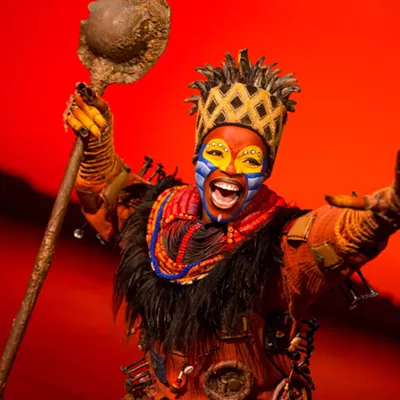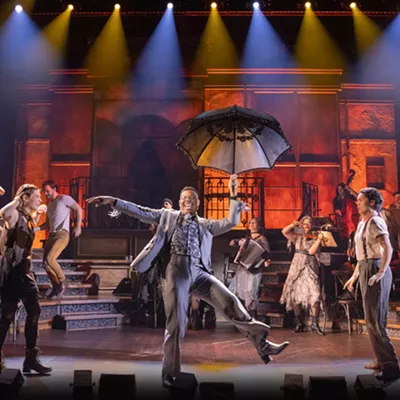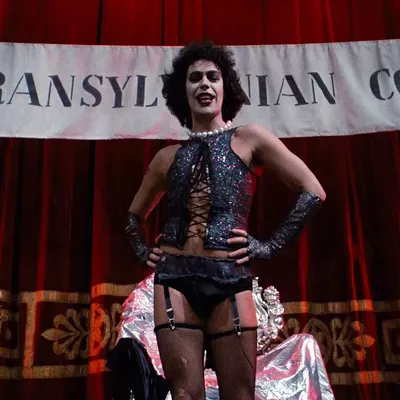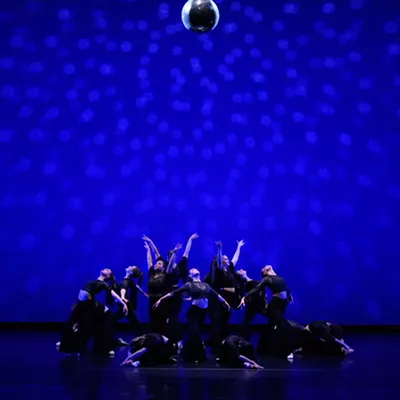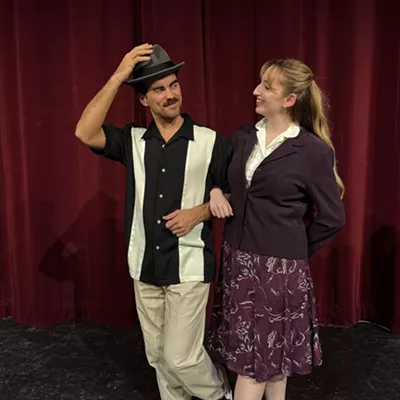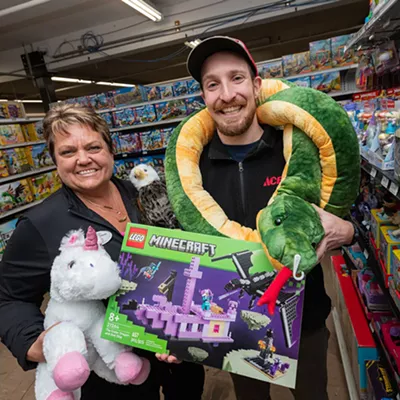Having recently been cast in the lead role of Fanny Brice in the nationally touring production of Funny Girl, which comes to Spokane this weekend as part of the Best of Broadway lineup, Hannah Shankman describes the experience in ways that you might expect: "thrilling," "incredible" and "crazy." But she also uses another, less common word that's much more revealing: beschert.
Beschert is a Yiddish word that means "preordained" or "destined." And for Shankman, there's a sense that Fanny is the part she was always meant to play.
"As a child, I had the biggest crush on Omar Sharif," she says. "I know that sounds random, but I loved watching his movies, and it's sort of how I found Barbra Streisand," who reprised her role in the Broadway musical to star with Sharif in the 1968 cinema adaptation of Funny Girl.
"Watching her just create this absolutely, unapologetically vulnerable, humorous, confident woman was so inspiring as a child that I think it really helped propel me into the career that I wanted as an actor. When they first announced that Funny Girl was reviving on Broadway, I was so excited to be stepping into Fanny's shoes after these iconic women like Barbra and Lea Michele."
Fanny herself was a real-life figure and no less iconic. You could argue that she helped pave the way for later cross-media female entertainers like Streisand and Michele or, to cite two of Shankman's examples, Joan Rivers and Sarah Silverman.
Born in 1891 into a Jewish immigrant household in New York's Lower East Side, Brice made her way onto the burlesque circuit while still a teenager. That was soon followed by a long involvement with the Ziegfeld Follies, a showbiz platform that led Brice to additional fame in music, film and Broadway revues. She was especially well known for her mischievous Baby Snooks character and the 1921 torch song "My Man," which became an international hit.
The lines in "My Man" that run "But I love him / I don't know why I should / He isn't good, he isn't true" could easily have been describing Brice's second marriage to the grifter, philanderer and gambler Nicky Arnstein. Those years were tumultuous ones that saw her trying to maintain her entertainment career and young family while Arnstein was otherwise occupied in schemes, courthouses and jails.
That topsy-turvy relationship became a central feature in Funny Girl, albeit simplified for the sake of plot and pacing when the trio of Jule Styne, Bob Merrill and Isobel Lennart created the musical in the early 1960s. To gain a fuller understanding of her character beyond the musical, Shankman tucked into the ample biographical material on Brice.
"I learned a lot about her life, her upbringing, her relationship with Nicky Arnstein, her relationship with her mother. And I really allowed that to inform my springboard into the role," she says.
It helped, she adds, that Harvey Fierstein's revisions to the book for the 2022 Broadway revival removed "some of the things that were unnecessary, really [clarified] the plot and [strengthened] the relationship between Fanny and Nick." The updated musical also adds two numbers, including the song "Temporary Arrangement" as sung by Nick.
"While the show is definitely a love letter to the theater, I actually think that at its core, it's really a love story, not only just between Fanny and Nick Arnstein, but between Fanny and herself."
These myriad — and sometimes competing — loves are at play in the act one closer, "Don't Rain on My Parade," perhaps the musical's most famous number. "Don't tell me not to live... Don't tell me not to fly / I've simply got to," Fanny sings to Nick, even as she agrees to make sacrifices to be with him.
"There really is this power switch that happens halfway through the show. It's Fanny putting her foot down and saying, 'This is what I want and I'm gonna get it.' She does that with her career, and she does that in her relationships, sometimes to her detriment, but she really knows how to dig her heels in and ground herself and go after what she wants."
And if the more than 20 costume changes weren't enough to suggest the multifaceted qualities of Fanny Brice, there's a side to her character that Shankman says is captured by yet another tune that transcends the musical. It's "People," a song that Streisand made famous and fought to have retained in the original score.
"It's one of the few times where we really see Fanny strip away her tough side, her strength, and really be vulnerable. It just has such a special spot in my heart," Shankman says.
She's confident that even lifelong Funny Girl fans like her will discover new sides to Fanny in this production, too.
"You're just going to see a completely different Funny Girl than the one from 1964 or in the movie," she says. "It's exciting for us, and it's really exciting for the audiences." ♦
Funny Girl • Oct. 1-5 at 7:30 pm; also Oct. 5 at 2 pm, Oct. 6 at 1 and 6:30 pm • $39.50-$94.50 • First Interstate Center for the Arts • 334 W. Spokane Falls Blvd. • broadwayspokane.com • 509-279-7000




